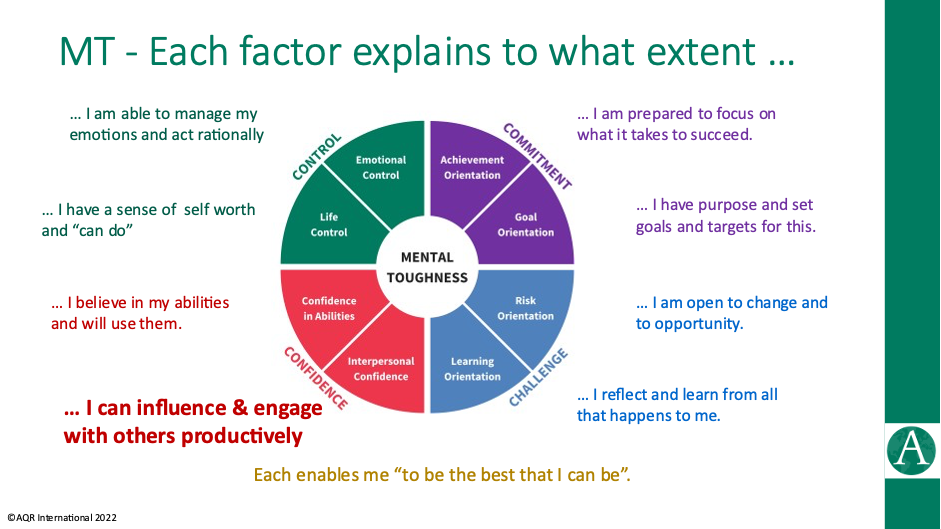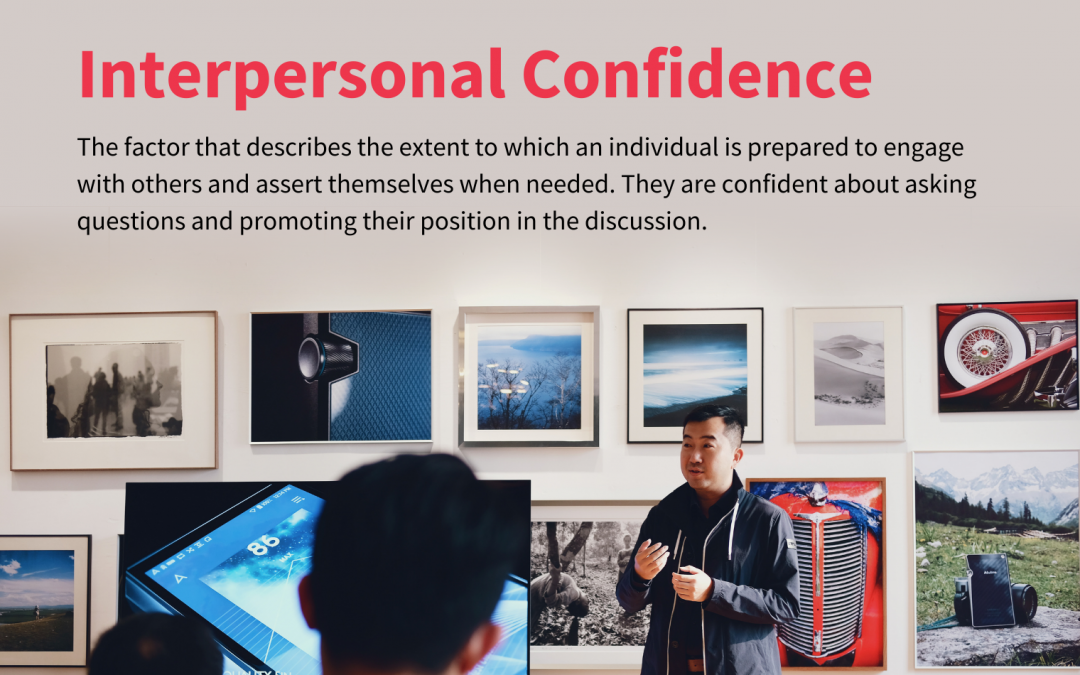Interpersonal Confidence is the last in a series of posts about the eight factors that form the mental toughness concept – a personality trait that describes our mental responses, how we think, to stressors, challenges and opportunities and is a major influence on behaviour – how we act.
Interpersonal Confidence is the second of the two factors that contribute to our overall sense of Confidence – that self-belief in our capabilities to be able to deal with whatever comes our way. This factor describes a mindset towards a particular set of abilities which enable us to engage productively with others. It contributes to our self-esteem.
Originally it was thought that this represented assertiveness although we now understand that it embraces more than this. It describes our confidence about being able to engage comfortably with people – particularly people whom we may not yet know or don’t know well.
This factor will manifest itself in the more mentally tough as being comfortable entering a group of strangers and initiating connections, making presentations and speeches, contributing to discussions, and standing your ground when challenged.
One of the more important manifestations is being prepared to ask questions. The mentally sensitive will often hold back for fear of seeming “stupid”. The more mentally tough don’t think this way – they want to know the answer.
The outcome we seek is to be able to influence others as much as they influence you. Whether that is sharing information or persuading them to your point of view.
It explains why two people, who are equivalent in many ways, will respond differently when asked to attend a meeting where they are expected to represent the organisation. One will say “That’s fine. I know what I am going to put over and I am happy to deal with what arises”. The other will say/think “That scares me. I will sit and listen.”.
The difference lies in their respective mental approaches.
“If we fail to engage with others, even in making the effort, we fail to find the similarities and the differences that help us to build productive relationships” – Doug Strycharczyk
As part of the Confidence construct, this factor enables us to be able to face the world, with all its ambiguities and uncertainties, with the belief that “I am armed to deal with it”.
This factor, like all the factors, is a spectrum with mental sensitivity at one end and mental toughness at the other. It is not a black and white idea – there are many shades in between. In fact, most people have elements of mental toughness and mental sensitivity in their make-up.
And, although each factor is independent of the other, the way they can interplay will matter in that they give rise to different outcomes – at least 40,000 possible combinations.
So, two people, who are similar in terms of Interpersonal Confidence, might differ in what they do if one has a high level of, say, Achievement Orientation (will confidently engage others in the task) and the other has a low level (will engage with, but may not inspire others).
This illustrates that personality is complex and nuanced and how the mental toughness concept (and the MTQPlus) measure can bring that nuance to the practitioner.
The image helps us to think about how different levels of Interpersonal Confidence might result in different outcomes with different levels of the other seven factors.

There is another layer of complexity to consider. All things being equal, being more mentally tough will give an advantage to the individual. But not always.
It is perfectly possible for a mentally tough person to struggle and for the more mentally sensitive to thrive. Self-awareness about this invisible mental response matters here.
If self-aware about one’s level of mental toughness, one can optimise it and can either develop it or one can adopt practices that help to compensate for the level of sensitivity.
How can a mentally tough person struggle? This sense of interpersonal confidence can mean they will dominate a conversation, blocking others and failing to listen to their views. In extremes, this can emerge as verbal bullying. They can get their own way when they are wrong. They can be stubborn and wear down others through relentless interruptions.
What are the positives for a more mentally sensitive person in terms of Interpersonal Confidence? They can be good at listening and weighing up others’ views before making their point. Because they listen, they can bring a useful caring approach to situations that need it.
This degree of nuance is true for all eight factors and all interplay with one another. Mental toughness provides a lens through which people can be supported to look at themselves and understand exactly where their development needs might lie.
The mental toughness concept is about differences and not about “good or bad” or labelling people as types or colours. Development can be customised in a way that isn’t yet widely practiced. “One size fits all” approaches generally fail and can do more harm than good. *
Assessment remains a challenge. The factors are “invisible” and any one, or combination of factors, can explain behaviour or wellbeing. It can be difficult to confidently assess a mental toughness profile. The research behind the concept has resulted in the development of a reliable and valid psychometric measure the MTQPlus.
Both the concept and the measure represent real advances in our understanding of individuals (and organisations). For practitioners who are engaged in developing these understanding mental toughness goes beyond CPD. It should really be part of their armoury.
Like the image used in this post on Interpersonal Confidence and others in our ‘Eight Factors’ series? A set of downloadable posters are available here.

Doug Strycharczyk 2023


